In perfect harmony: Johnny Marr and Jon Savage on music, work ethic and politics
Post-punk friends, writer Jon Savage and guitarist and singer Johnny Marr meet to discuss their relationship, their enduring work ethic and the challenges facing young people today
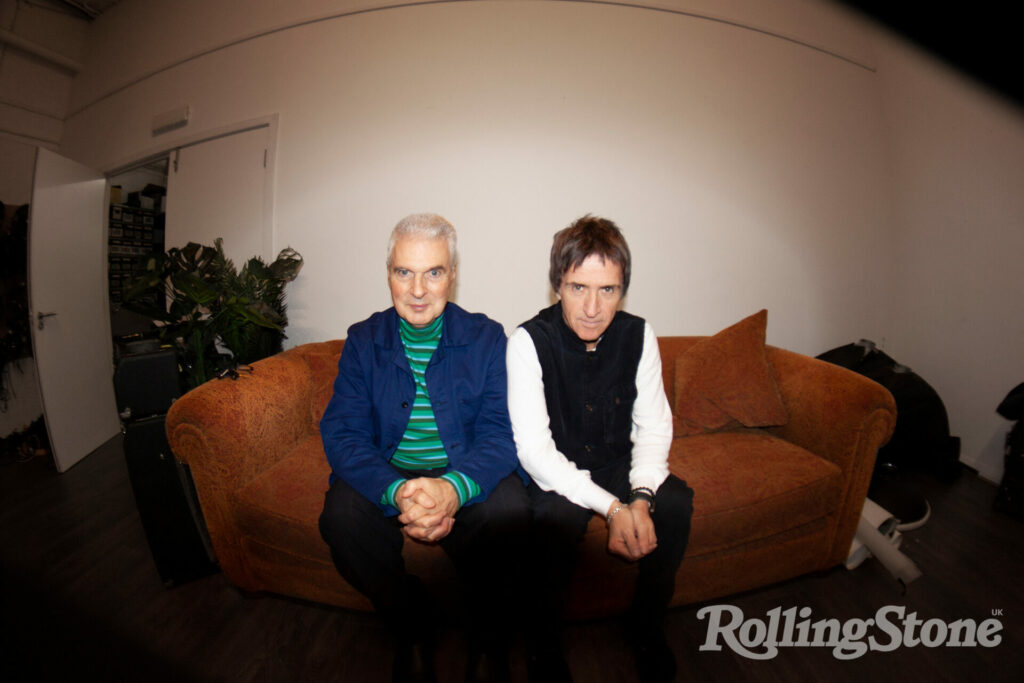
Today has been declared an Equals day. This wasn’t a call made by Rolling Stone, but by avid fans of the north London pop group and long-time close friends, author and music journalist Jon Savage and legendary guitarist and songwriter Johnny Marr. As we sit in Marr’s Stockport studio on a fiercely dreary Monday afternoon, the mood in the room is brimming with enough elation to clear the leaden skies as the pair share anecdotes while The Equals’ hit ‘Black Skin Blue Eyed Boys’ blares in the background. “I play this before I go on [stage],” Marr exclaims. “Can’t get away from it for 40 years.”
Seeing Marr and Savage together it is easy to understand why their friendship has spanned decades. Their respective careers have seen both lauded as documentarians of youth culture and key cogs in the post-punk British music scene.
After getting his start in music journalism at the peak of British punk in the mid-70s, Savage made his name covering many of the major punk acts of the era in Sounds magazine, before moving to Melody Maker and the newly founded The Face. His first book, the award-winning England’s Dreaming (published in 1991), is a meticulous history of punk rock in the UK, depicting a generation hungry for change (a new edition has recently been published through Faber & Faber featuring a foreword by Marr). Throughout his work, whether in the 2007 book, Teenage, which documents youth culture through 1875-1945, or 1966, focusing on the cultural movements of that year, Savage looks deeply at the impact pop music and youth have had on our wider culture.
Marr, on the other hand, is most well known as the man who inspired a thousand indie guitarists with his innovative guitar sound as a member of The Smiths. The band released four albums, including the critically acclaimed The Queen is Dead (1986), which ranked 113th on Rolling Stone’s 500 Greatest Albums of All Time. After The Smiths broke up in 1987, Marr went on to collaborate with numerous artists in the late 80s and 90s, including Electronic, The Pretenders and, in the early 00s, The Cribs. He is also a prolific session musician, working with Hans Zimmer on the score for the latest James Bond film, No Time To Die (2021).
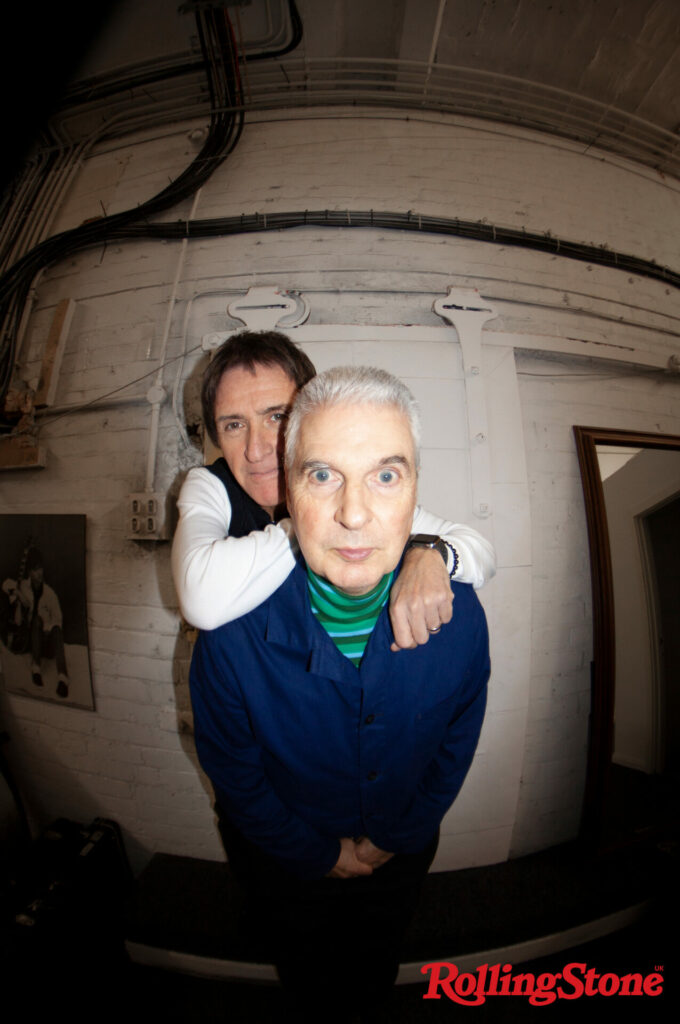
Marr and Savage grew close when the pair began to hang out at the former’s house which became a hub for Manchester’s music scene in the late 80s and early 90s. Savage, who was going through a difficult time, stayed at Marr’s house for six months. “When people are friendly when you’re having a bad time, you really remember that,” says Savage. He quickly became a part of the family, so much so that Marr’s kids gave him the nickname “goofy Jon”.
The pair discovered that they shared similar tastes and outlooks on the world. “We both love pop music, obviously, but we also like talking about ideas and people,” says Savage.
No matter the topic, Savage and Marr tussle with ideas and bounce off each other as you’d expect for two people who’ve spent decades learning from one another; so much so that they sometimes become one and the same. “If you need to interview Jon, talk to me, and if you need to interview me, talk to Jon,” Marr quips.
Today, as they monkey around together on their photoshoot — Savage pulling faces at the camera in between discussing his haunted memories of doing PE at school, while Marr jokingly shows Savage how to stand (“so, obviously, like a band, you have to get in closer than you think, but that’s all right ’cos we’re besties, aren’t we?”) — their comradery is evident. In the run-up to Marr’s upcoming album, Fever Dreams Pts 1-4, Savage and Marr discuss their latest work, what made the late-80s music scene in Manchester so special, and why they think life is harder for young people today.
Meeting, The Smiths, and the Manchester scene
JOHNNY MARR: We first met professionally, didn’t we, Jon? It would have been a Smiths article for… who was it for?
JON SAVAGE: I actually checked when it was, I’ve got it here. It was actually for the Sunday Times, pre-Wapping, because I wouldn’t work for them after that. The article is dated January 1984, and Johnny Marr speaks as well as Morrissey, which is a nice change. I must have met you at a London gig in very late 1983.
We did a second interview, but it wasn’t like we kept in touch. Our paths would cross professionally and then we became friends in, I’d say, about 89-90, because of mutual associations with Pet Shop Boys. The band that I had with Neil Tennant and Chris Lowe, and Bernard Sumner [the alternative dance supergroup Electronic], we all had this extended circle. Those times were very much like that. [They were] very social, the kind of ravey, electronic, Hacienda [days]. We reconnected, Jon and I, through that project, at a time when there were a lot of social connections and creative connections being made.
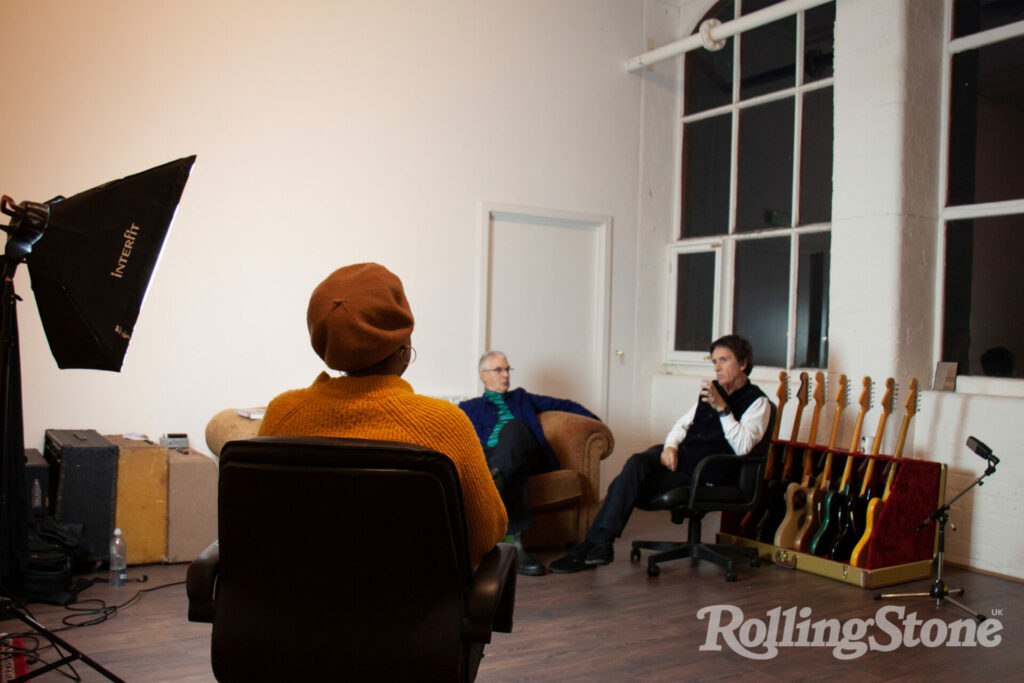
Yeah, it was a time of opening out. You had the oppressive Thatcher government. I came back to Manchester and, suddenly, walking down the street, it was kids in Day-Glo. It just felt so different.
Manchester was the centre of the musical universe at that point. Wherever I went around the world, pretty much the first question, after “When are The Smiths gonna reform?” was “Why is Manchester the centre of the universe?” That’s when we became pretty tight, pretty quick, and you started spending a lot of time in my house. My house was quite an HQ in Manchester, wasn’t it, would you say?
It was. Owen Morris was there, who produced early Oasis. And who else?
[Happy Mondays percussionist] Bez was around quite a bit, wasn’t he, and the [Happy] Mondays’ scene was there and a lot of the common movers. My house was a creative hub, which was fantastic creatively — wasn’t so good, family-wise, later on.
I remember sitting with Edwyn Collins [lead singer in 80s post-punk band Orange Juice] in 1984 and we played ‘Jeane’, which was the B side of ‘This Charming Man’. In the middle of it, Johnny goes [vocalises] twang, and we got really excited. Just that twang. It changed everything.
That was a good twang, Jon. I’m glad someone was listening.
It was a great twang. It was the twang that reverberated through the years. I must have seen you loads of times. I remember seeing you at the Palladium.
We were a bit of a mental band at that point. In a good way. Some people who weren’t around at the time probably don’t realise that The Smiths were very heavy.
So many thought it was just flowers and ‘William’ and ‘Heaven Knows I’m Miserable Now’.
We were a political band, with a very, very big capital P, because we were about party politics, but we were also about personal politics as well, the politics of the individual. The times that we came out of, The Smiths, I’m very pleased to say if you were in an alternative rock group, it was a given that you were against the government. We came out of this period with people like New Order, Echo and the Bunnymen, and Depeche Mode. When we hit America, all these British bands… I always say we liberated the straight guy, and I was quite proud of that. But The Smiths had a bigger agenda.
And also just simply music. If you look at any of the repeats of Top of the Pops in 1984, there’s all the guys with big padded shoulders and, most notably, the jackets halfway up their arm, and suddenly on come The Smiths and they’re really intense, and they sound completely different. That’s where you start getting into all the other things, like the politics. You get intrigued by that, but as always with pop music, it’s the sound, something grabs you and there’s maybe a stray lyric you hear that snags you.

Staying in tune
When we get together, we sort of swap notes about electronic music. You really liked Frank Ocean and turned me onto Frank Ocean. Whether I like it or not, I’m always involved in guitar music. Neither of us is slavishly chasing the new — that would be somewhat tragic — but it just so happens that we happen to come across new stuff. It is a fact that certain aspects of the 80s’ aesthetic and sound have been appropriated by modern guitar bands these days and I think it’s been done very well because it doesn’t seem to me to be particularly nostalgic. I think partly because that in technology, in the 80s, the idea was to be futuristic. Futuristic is always quite handy.
It’s always a good idea in pop music.
I love the band Sorry. They’re interesting enough; female and male. [And the group] Goat Girl: the clue is in the title.
There’s a whole raft of people my age saying, “It’s not like it was in the old days.” Well, who cares what you think! I’m always interested in working with younger people because they have a completely different experience than we do. I know what I think. I know it so well I almost get bored with it, so it’s interesting to hear what other people think, what the younger people think, people with different experiences. That’s the way to grow anyway. It’s also about being empathetic.
And, also, alternative music — which I still believe in, and the reason why is because I don’t like the mainstream — should reflect exactly what is going on.
Well, absolutely. And don’t talk to me about… can I be a quick bitch or shall I forego it? When three Christmas singles are Ed Sheeran, Elton John and Adele, you might as well just give up. I still have the rock critic in me and it says: “Just do one.”
I think the changes in so many things, say gender politics, are entirely down to this generation. So our generation were of course affected, but in the 80s, we were more concerned with national politics. There was all the strikes, there was a privatisation, there was unemployment. Whereas this generation of people now in their teens and 20s and early 30s, quite rightly, it’s more to do with global concerns, corporate concerns, also the concern of the individual.
I think it’s very hard for young people now for two main reasons. Number one is just the amount of information available. There’s so much out there, you can find out anything. It’s so niche, it’s so broken up. It’s very difficult to get people together in the same way. But also you’ve got climate change. That’s the biggie. That’s behind everything that’s happening now, including Brexit.
For my generation, certainly for my background, we were the first generation of school leavers who were told in very alarming and big headlines, the first million unemployed. Now, that is a really depressing message because it basically says “Scrapheap, scrapheap, scrapheap, you are not worthy.” As a parent, one of the things that I saw throughout the early 00s into the present day is that … what has got worse for young people now is the invisible hand of capitalism that comes down from the skies and at every opportunity reaches into a child’s pocket. I may be being naive, but I don’t remember it being quite that fucking cynical when I was young.
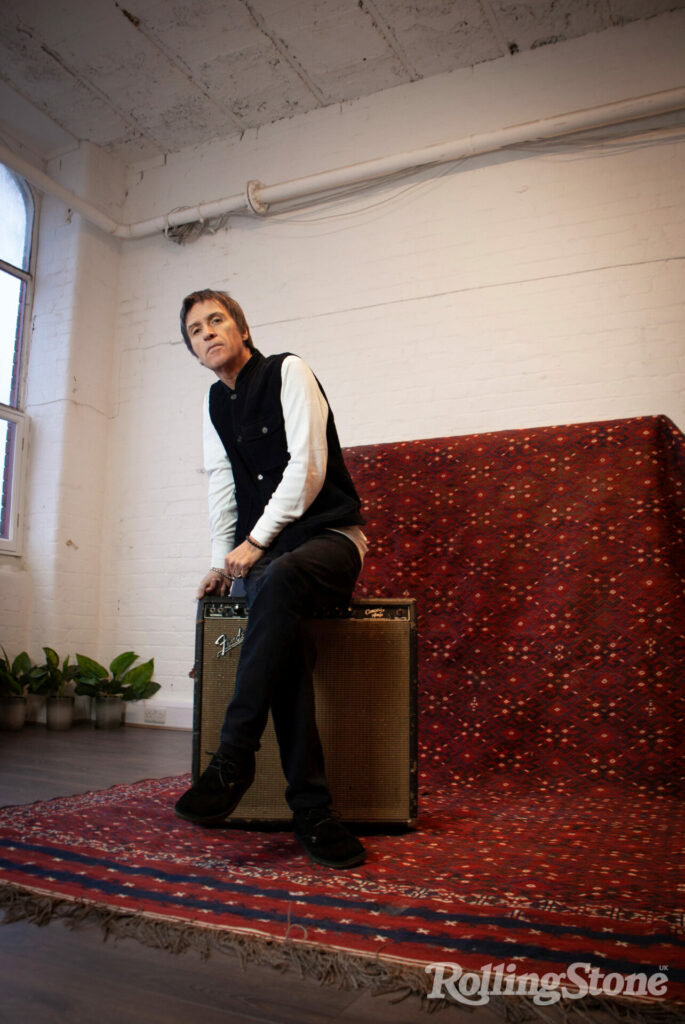
Going solo, and Marr’s new album
I really liked the fact that you went solo. I think that’s incredibly important. After being a fantastically skilled guitarist, arranger, producer for so many years, to suddenly make the step into becoming a singer, and working out how to become a singer, what your pitch was. I saw all that happening. I do regard this album [Fever Dreams Pts 1-4] as the culmination of it.
Carry on, Jon.
What I noticed in a lot of songs is they have euphoric breakouts, so suddenly, you go into a very up vocal phrase.
Well, ‘Night and Day’, for example, on the face of it, is a pop single. It does sound a bit like something I could have done with Electronic or Pet Shop Boys, but [the lyrics] “just wanna breathe in the hotspots”, I was singing about Black Lives Matter. I like smuggling in something serious if you’re listening hard enough.
‘Receiver’ has got another euphoric breakout. That’s another good one. It’s very you because there’s a lyric, which is “I’m a freak for the impossible”.
On a lot of songs, if it’s getting quite heavy, I tend to try and let the listener know that I think I’m a bit… I make fun of myself, so I do often refer to myself as being confused.
Yeah, but you also like the idea of the freak?
I always identify with the freak. When I see a young person in extreme clothes, particularly a young woman, I just think, ‘The freaks are still alive.’ The English or the British do freaky very well, after the Japanese. Americans can do it, but it stands out more to me. Freaks are really important because they scare the establishment.
On Bond and the future
Did the experience of working with Hans Zimmer on the Bond theme and Inception change your writing at all? I noticed a bit of cinematic production.
Yeah, I’d say that working with Hans has brought that in. It’s made me double down on some things because I didn’t realise until I was told that guitars in films were a no-no for a few decades because of some atrocities that were committed in the 80s. Inception changed that. It was such a big movie — after that, [in] so many television adverts you would hear my riff and Hans’s horns. Also, because I used a 12-string guitar on all of the [scores], it’s got me back to playing the 12-string.
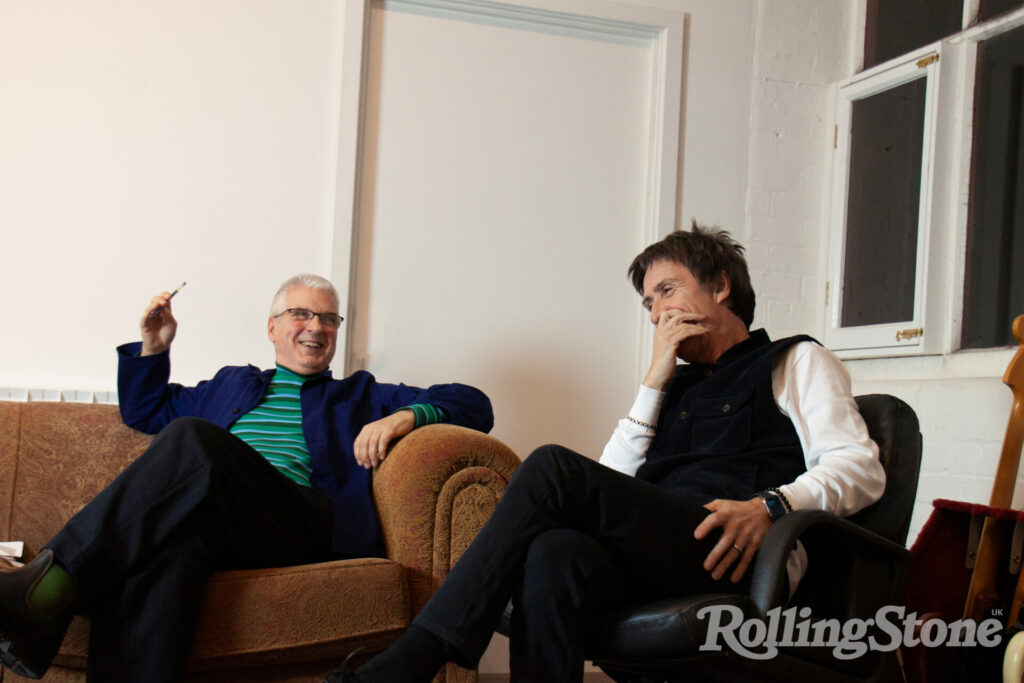
But also, how great was it to do the Bond riff on the guitar?
That really was a highlight [laughs]. When I did it, I went and phoned my mum, “Guess what I’ve just done, Mum!”
We do share an idea of not wanting to rest on any laurels. I’m trying to always look forward. I don’t get trapped in the past. I’m always thinking: ‘What’s happening now?’ And: ‘What’s happening next?’
We talk a lot about our work and neither of us have ever had a conversation about slowing down.
No, I’m gonna work till I drop.
We both want to continue doing what we do. We’re both aware of how fortunate we are to do what we do. I’ll say it for the both of us: we put the fucking hours in. Whenever I finish an album, I say to John, “Next time, I’m going to do it different,” and he says, “No, you’re not, dear.” It has to be that way. When he finishes a book, he says, “Next time, I’m going to do it a different way,” and I say, “No, you’re not.” I think we both want to keep doing what we’re doing because…
…because you do get better at it. The whole idea is you keep on growing, particularly much more so with a pop musician, there’s a temptation to think, ‘Oh, well, I made it, I’ll stay there.’ But that’s not the way it works.
I didn’t like touring in The Smiths. Pretty much because it was The Smiths. I came to like touring quite late in my life. Now I absolutely love it. The immediate future is more touring for me next year with Blondie and The Killers and my own stuff. Because I learned to love it later on my career, I’ve still got…
You’ve still got the hunger.
Johnny Marr’s double album Fever Dreams Pts 1-4 is released on 25 February.
